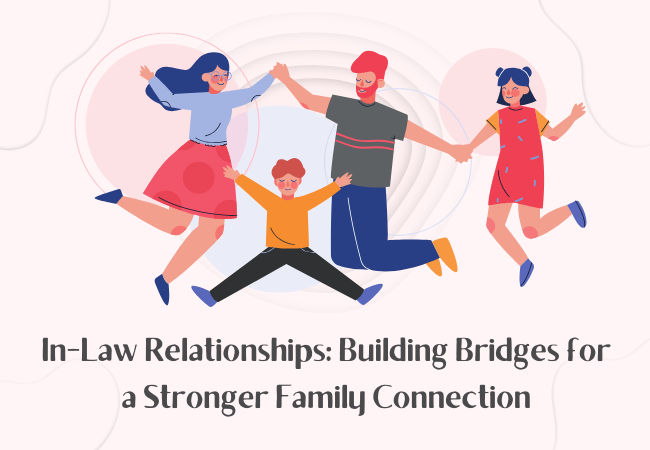In-Law Relationships: Building Bridges for a Stronger Family Connection
Struggling with in-law relationships? Learn effective strategies for building bridges and fostering positive connections with your extended family, ensuring a harmonious and supportive family dynamic.
In-law relationships can be a source of joy, support, and love – or they can be challenging and stressful. For many, navigating these relationships is a delicate balance. This guide offers practical advice and strategies for building stronger, more positive connections with your in-laws, ultimately creating a more harmonious family dynamic.
Understanding the In-Law Dynamic

Before we dive into specific strategies, it’s important to understand why in-law relationships can be complex:
- Different family cultures and traditions
- Varying expectations and boundaries
- Generational differences
- Protective instincts towards one’s own child/spouse
- Adjustment to new family roles
The Importance of Healthy In-Law Relationships
Building strong in-law relationships can have numerous benefits:
- Increased family support system
- Reduced stress in your marriage
- Better environment for children/grandchildren
- Richer family experiences and traditions
- Enhanced overall family harmony
Strategies for Building Positive In-Law Relationships
1. Start with the Right Mindset
Approach the relationship with openness and positivity:
- Focus on common ground rather than differences
- Assume good intentions
- Be willing to learn and adapt
2. Set Clear Boundaries
Establish healthy boundaries early on:
- Communicate openly with your spouse about expectations
- Respectfully express your needs and limits
- Be consistent in enforcing boundaries
3. Show Respect for Family Traditions
Embrace and respect your in-laws’ traditions:
- Ask about family customs and their significance
- Participate in family traditions when possible
- Blend traditions from both families to create new ones
4. Communicate Effectively
Practice good communication skills:
- Listen actively without judgment
- Express yourself clearly and calmly
- Avoid criticism and blame
- Use “I” statements to express feelings
5. Find Common Interests
Look for shared interests or activities:
- Engage in hobbies together
- Discuss topics you both enjoy
- Plan outings based on mutual interests
6. Be Appreciative
Express gratitude for your in-laws’ efforts:
- Thank them for their help and support
- Acknowledge their role in your spouse’s life
- Show appreciation for their time and gifts
7. Maintain Independence
Balance closeness with independence:
- Avoid over-reliance on in-laws
- Make decisions as a couple
- Establish your own family unit while still including extended family
Navigating Common In-Law Challenges
1. Dealing with Unsolicited Advice
- Listen politely, but remember you’re not obligated to follow it
- Respond with a simple “Thank you for your input”
- Discuss with your spouse how to handle persistent advice-giving
2. Managing Different Parenting Styles
- Clearly communicate your parenting decisions
- Be respectful but firm about your choices
- Find areas where grandparents can have more freedom with grandchildren
3. Handling Cultural Differences
- Educate yourself about your in-laws’ culture
- Be open to learning and participating in cultural practices
- Blend cultural traditions when possible
4. Addressing Favoritism
- Communicate concerns calmly with your spouse first
- If necessary, have a respectful conversation with in-laws
- Focus on creating equal opportunities for bonding
5. Managing Holiday Stress
- Plan ahead and communicate expectations early
- Be willing to compromise and alternate holidays
- Create new traditions that include both sides of the family
The Role of Your Spouse
Your partner plays a crucial role in managing in-law relationships:
- They should be the primary communicator with their own parents
- Support each other in setting and maintaining boundaries
- Present a united front on important issues
- Mediate conflicts when necessary
When to Seek Professional Help
If in-law relationships remain strained despite your best efforts, consider:
- Family counseling
- Individual therapy to develop coping strategies
- Couples counseling to strengthen your united approach
Conclusion
Building strong relationships with in-laws is an ongoing process that requires patience, understanding, and effort from all parties involved. By implementing these strategies and approaching the relationship with a positive mindset, you can create a more harmonious family dynamic. Remember, the goal is not perfection, but rather a respectful and supportive extended family network.
Every family is unique, and what works for one may not work for another. Be willing to adapt these suggestions to fit your specific family situation. With time and effort, you can build bridges that strengthen your entire family unit, creating a legacy of love and support that extends across generations.
For more resources on improving family relationships, check out these helpful links:
- Tips for a Healthy In-Law Relationship
- Managing In-Law Relationships
- Family Dynamics and Communication
Remember, investing in your in-law relationships is an investment in your family’s overall well-being and happiness. With patience, understanding, and open communication, you can build strong, positive connections that enrich your family life for years to come.
For more information and guide, visit usaparentingtips.com






